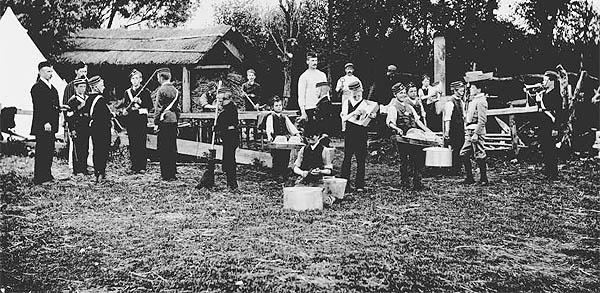
Bristol Boys Brigade Camp, 1893. ‘Reproduced by kind permission of the Secretary of Avon Boys Brigade’.
In 1888 the Boys’ Brigade in Scotland was prevalent in portside cities. Glasgow (93 Companies), Edinburgh (17), and Ayr (6) were home to the largest Battalions.[1] When the movement became established south of the border this pattern was replicated. By the end of the century London was the second largest area of strength nationally (83 companies), with Liverpool (32) and Manchester (30) considered imperative to the rapid development of the organisation.[2] The port city of Bristol provides a further example of strength for the movement in its formative years.
The first Company in Bristol was formed in November 1888 at the Hope Sunday schools in the Clifton area of the city.[3] Within a few years a Battalion was created from Companies affiliated to five churches in the city.[4] By 1894 the status of the movement was especially apparent when Bristol hosted the 10th Annual Council Meeting of the Boys’ Brigade, which saw delegates from across the World converge on the city to consider the annual report and construct the plan for the future.[5] The first camp of the Bristol Battalion was at held at Winscombe in 1892 where around 80 boys spent ten days in the Cheddar Valley.[6]
Camping is a leisure activity often closely associated with the Boys’ Brigade and other similar youth movements. This is so much the case that in his seminal text on British youth movements John Springhall commented that “To attempt a history of British youth movements without mentioning the subject of camping would be rather like writing a history of nineteenth century China without mentioning opium”.[7] Discourse in this area is dominated by an idea that camping held the attention of boys, with other aspects such as drill class endured in order to spend a week under canvas by the sea or in the countryside.[8]
The summer camp was an annual affair for the Bristol Battalion which often took place near Weston-super-Mare. An article in the Bristol Mercury from the summer of 1894 outlines the programme for the camp which included activities such as cycle races and cricket.[9] However, the correspondent commented that:
An individual who was particularly keen to instil military styled regulations on camp was Mr H. J. Usher. Mr Usher, Captain of the 6th Bristol Company, acted as Commanding Officer of the Battalion camp between 1896 and 1920, during which time he was known for his stern and efficient methods.[11]
For those who claim that boys avoided military elements when possible in order to attend the summer camp would have found it difficult to avoid– at least in the case of the Bristol Battalion – as boys were presented with a week where military discipline was to the fore of the agenda. The case study of port town Bristol brings into question the role of camping within both the Boys’ Brigade and other uniformed youth movements in the decades preceding the First World War.
References
[1] Brian Fraser, “Towards a True Christian Manliness”, in eds., John Springhall, Brian Fraser, and Michael Hoare Sure and Stedfast. A History of the Boys’ Brigade 1883-1983, (London: Collins, 1983), 46-71;.47.
[2] Fraser, “Towards a True Christian Manliness”, 53.
[3] “Bristol Volunteer Diary To-Day”, The Bristol Mercury and Daily Post, issue 12640, 15 November 1888, 5.
[4] “Boys Brigade, Bristol Battalion, Diamond Jubilee Brochure 1889 – 1949”. Printed by Partridge and Love LTD, Bristol. Pamphlet/1042. 1949.
[5] “The Boys’ Brigade”, Bristol Mercury and Daily Post, issue 14461, 15 September 1894, 3.
[6] Boys Brigade, “Bristol Battalion, Diamond Jubilee.”
[7] John Springhall, Youth, Empire and Society: British Youth Movements, 1883-1940, (London: Croom Helm, 1977), 98.
[8] Hugh Cunningham comments that the main attraction for boys and girls to join youth movements was perhaps the annual camp which outweighed concerns about being ridiculed. Stephen Humphries asserts that camp was one of the activities which most attracted members, with drill a concession to be avoided when possible. Bernard Porter makes similar claims relating to the Boy Scouts whereby activities offered- particularly camping – attracted children: not the values of the movement. Hugh Cunningham, The Invention of Childhood, (London: BBC Books, 2006), 209; Stephen Humphries, Hooligans or Rebels? An Oral History of Working-Class Childhood and Youth 1889-1939, (Oxford: Basil Blackwell, 1981), 134; Bernard Porter, The Absent-Minded Imperialists, (Oxford: Oxford University Press, 2004), 208-211.
[9] “The Boys’ Brigade Camp at Sand Bay”, Bristol Mercury and Daily Post, issue 14428, 9 August 1894, 8.
[10] “The Boys’ Brigade Camp at Sand Bay.”
[11] Boys Brigade, “Bristol Battalion, Diamond Jubilee”










Comments are closed.